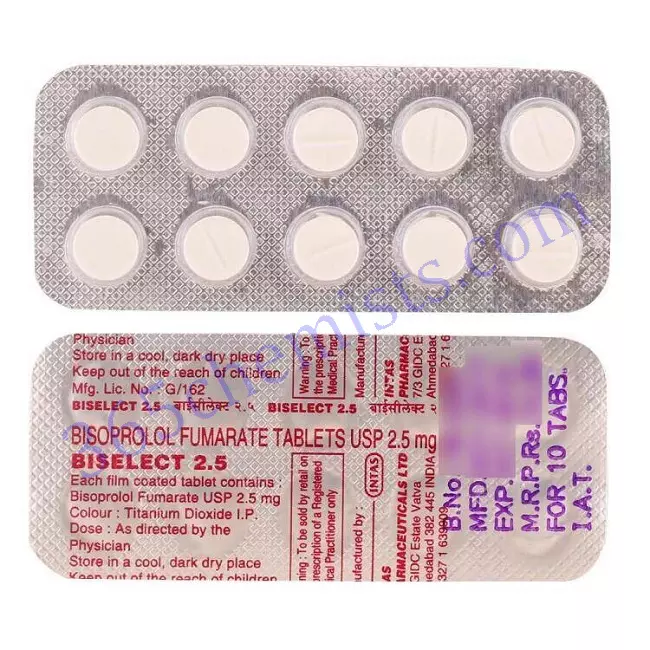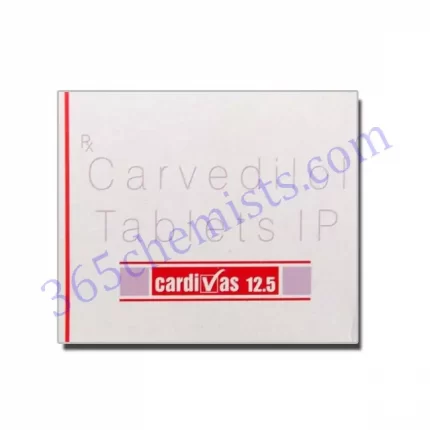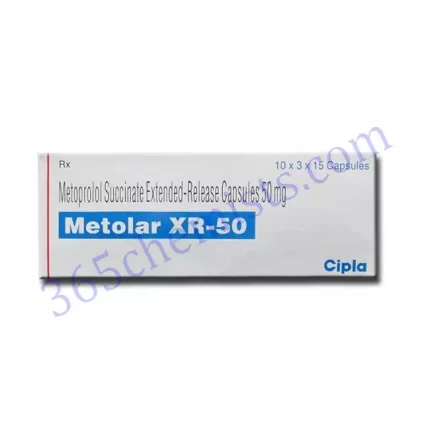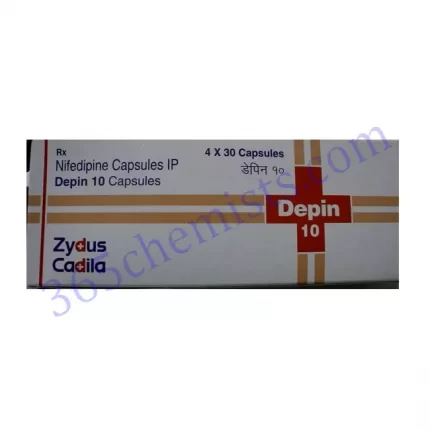Biselect 2.5 Tablet: Managing Blood Pressure with Bisoprolol 2.5mg
A drug called Biselect 2.5 Tablet is one that can be recommended for the management of high blood pressure. Its active component is called bisoprolol, and it is found in this product. A frequent disorder that can increase the risk of heart disease, stroke, and other cardiovascular consequences is high blood pressure, commonly known as hypertension. High blood pressure is also known as hypertension. Beta-blockers are the kind of pharmaceuticals that Biselect 2.5 Tablet is a part of. These medications operate by preventing the effects of specific chemicals that are already present in the body from leading to an increase in blood pressure.
Managing Blood Pressure
The Biselect 2.5 Tablet is an excellent medication for lowering blood pressure since it eases the workload placed on the heart while simultaneously relaxing the blood vessels. This helps the heart pump blood more efficiently and lowers the total pressure in the blood vessels. It does this by slowing down the heart rate and reducing the force of the contractions. This can assist in preventing damage to the organs and blood vessels, as well as lowering the likelihood of cardiovascular events occurring.
Dosage and Administration
Your healthcare provider will decide the appropriate dosage of Biselect 2.5 Tablet for you based on your current blood pressure levels, as well as your overall health and how well you respond to therapy. It is essential to take the medication in the manner that has been instructed and adhere to the dosage that has been recommended. In most cases, a single once-daily dose of the Biselect 2.5 Tablet can be taken either with or without food. Taking it at the same time every day helps maintain constant blood levels, which in turn maximises the effectiveness of the drug.
Related Product
Biselect 2.5mg Tablet
Biselect 5mg Tablet
Biselect 10mg Tablet
Precautions and Potential Side Effects
Inform your healthcare practitioner of any medical issues you’ve had in the past, any drugs you’re currently taking, and any allergies you have before beginning treatment with Biselect 2.5 Tablet. Your medical history will be evaluated, and your healthcare professional will decide whether or not the Biselect 2.5 Tablet is appropriate for you to use. There is a possibility that taking Biselect 2.5 Tablet could cause you to experience fatigue, dizziness, headache, or chilly hands or feet. It is imperative that you get medical assistance if the adverse effects you encounter are severe or continue for an extended period of time.
Monitoring and Follow-up
Regular monitoring of blood pressure is necessary for determining whether or not the Biselect 2.5 Tablet is effective and for achieving the highest level of control possible. In order to evaluate how well the treatment is working, your healthcare professional may suggest having your blood pressure checked on a regular basis. It is essential to keep all of your follow-up appointments and to keep your healthcare provider updated on any modifications to your condition or worries that you may have. This makes it easier to make any required adjustments to the treatment, and it also helps to ensure that your blood pressure is managed as effectively as possible.
Lifestyle Modifications
Alterations to one’s lifestyle, in conjunction with the use of Biselect 2.5 Tablet, are an essential component in the management of blood pressure. It is possible that your healthcare professional would suggest that you adopt a diet that is healthier for your heart and lower in sodium, saturated fats, and cholesterol. Other key lifestyle modifications that can further enhance blood pressure control and overall cardiovascular health include engaging in regular physical activity, maintaining a healthy weight, limiting alcohol use, and avoiding cigarette use.
Potential Drug Interactions
It is imperative that you let your healthcare practitioner know about any and all supplements, over-the-counter medications, and prescription drugs that you are currently using. This includes any and all vitamin and mineral supplements as well. There is a possibility that Biselect 2.5 Tablet will interact with other medications, which could decrease its efficiency or raise the likelihood that it will cause adverse effects. Your healthcare practitioner will examine the possibility of drug interactions and make any necessary adjustments to your treatment plan in order to guarantee your well-being and make the most of the benefits that Biselect 2.5 Tablet has to offer.
Special Populations and Considerations
When administering Biselect 2.5 Tablet to members of certain communities, additional considerations may be necessary. Women who are pregnant or breastfeeding, as well as anyone who have certain heart diseases, asthma, diabetes, or liver illness, are among those who fall into this category. In these circumstances, your healthcare practitioner will evaluate the potential risks and benefits of using Biselect 2.5 Tablet and will offer you with counsel that is tailored to your particular need.
Adherence to Treatment
It is essential to stick to the treatment plan that your doctor has laid out for you if you want to get the most out of the Biselect 2.5 Tablet. Always follow the directions for taking a drug, and never skip a dosage or stop taking a prescription without first consulting your doctor or other healthcare provider. Continue with the treatment even if you are feeling OK because doing so will help you keep better control of your blood pressure and will lower the risk of cardiovascular events.
Summary and Final Thoughts
A drug called Biselect 2.5 Tablet, which contains bisoprolol at a dosage of 2.5 milligrammes, is one that is provided for the management of high blood pressure. It accomplishes this by successfully bringing the blood pressure down, which in turn helps bring the risk of cardiovascular problems down. To achieve the best possible outcomes, it is essential to take the medication exactly as directed, to make any essential adjustments to one’s lifestyle, and to monitor one’s blood pressure on a consistent basis. Talk to your primary care physician about getting individualised recommendations and instructions for controlling your blood pressure with the help of Biselect 2.5 Tablet. For the purpose of preserving cardiovascular health and lowering the risk of issues linked with it, it is vital to have blood pressure that is effectively managed. It is possible to take preventative measures towards achieving better management of blood pressure and overall well-being by combining the use of medicine with changes in one’s lifestyle.












